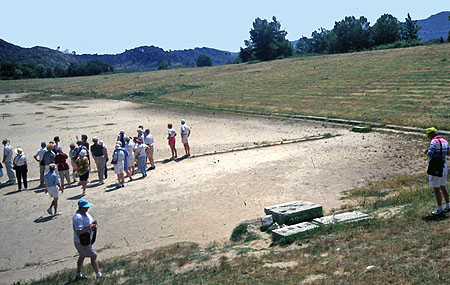HIS 111
Unit 4: Classical Mediterranean

If you wondered why
I have a photo of a bunch of people standing around on a field of dirt,
I would note that this is not just any field of dirt. This is the
site of the ancient olympics (Olympia, Greece), and the line of stones
across the dirt was the official starting line for the running
events. You can just barely make out the outlines of the seating
on the hill in the background. See some additional photos.
 What you must do in this unit
What you can do in this unit
What you must do in this unit
What you can do in this unit
- Listen to some further information for this unit
as a mp3 file. You can also read the information as
a txt file.
- You may listen to some further information about Classical
Greece and Classical Rome from my HIS 101 course.
- Read the remarks by Professor Blois about the fires that swept through Greece and threatened Athens in the summer of 2009.
- Take a look at the notes on the Dair Mar Elia monastery in Iraq. These were done by Joe Costigan, a student in HIS 111.
Some videos that you can watch for this unit
- See the videos dealing with the Classical Greece and Classical Rome in the HIS 101 Course.
- For extra credit please suggest to your instructor a relevant video for this unit of the course. Send the title of the video, the url and a brief explanation of why you find the video interesting and applicable to the material that is being studied in this unit.
Extra Credit Options
- Take the short 5-point quizzes for chapters 6, 7 and 8. Log into Blackboard and look under "Chapter Quizzes." You have five minutes to complete each quiz (multiple-choice questions).
- For a maximum of 50 points extra credit, read Cicero's essay
"On Duties" (De officiis), sometimes called "On Moral Duties" (www.constitution.org/rom/de_officiis.htm)
and write a one-page
paper (What would you conclude was Cicero's world view or
philosophy of life?).
- Read Plato's Allegory of the Cave and write a one-page paper (In your own words explain the
allegory and indicate why it is important.) for a maximum of 50 points.
- Read the documents
associated with the
Trial of Socrates,
including Plato's Apology. In a one-page
paper (maybe two pages), note and explain the main points of Socrates' defense
for a maximum of 50 points.
- You may choose to do an optional, extra credit assignment
on the Melian Dialogue (also at www.shsu.edu/~his_ncp/Melian.html (a long paragraph worth a
maximum of 25 points). In the "Dialogue," the Ancient Greek historian
Thucydides reconstructed the negotiations that took place between the
Athenians, who wanted to annex the island city-state of Melos, and the
Melians, who wished to remain neutral and not get involved in the
war between Athens and Sparta. In 416 bce, after discussions failed to
reach an agreement, the Athenians
invaded Melos and enslaved the inhabitants of the island. The representatives of
Melos argued for neutrality; Athens asserted that neutrality was just not good enough and
that Athens had a right, and duty, to assert its power. Sound familiar? The
"Melian Dialogue" remains a stunning example of how stronger
nations/countries/societies manipulate ideas of
justice and natural rights to achieve their own political ends. In
a one-page paper, assess the relevance of some of the issues touched on in
the "Dialogue" to recent (last 25 years) international politics.
- You may also choose to do an optional, extra credit assignment
on Thucydides (long paragraph worth a
maximum of 25 points).
- Read some of Aristotle's comments on democracy
(from his Politics), and for a maximum of 25 points extra credit,
summarize his views on democracy and the polis in a long paragraph.
- For a maximum of 25 points extra credit, read excerpts from the Meditations
of Emperor Marcus Aurelius and write a paragraph (What were some
of the principles of the Roman philosophy of stoicism reflected in
these Meditations?).
- For extra credit, please suggest a
relevant website for this unit of the course. Send the title of the site, the url and a
brief explanation why you find the information interesting and applicable to
the material being studied this unit.
|

